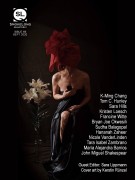You write about mothers and daughters a lot. What about this particular relationship draws you to it so often?
I often get obsessed with themes. Now, I’m writing a lot about mothers and daughters. Before, I was writing a lot about grandmas and granddaughters. I think in Latin culture, grandmas and mothers play such a key role. They’re such a heavy influence and also something that you feel connected so viscerally—it’s like they’re always looking, always observing and telling you how to live (sometimes differently than they did and other times, they just want you to repeat the same patterns because they don’t know any different) so it’s this thing that what they fear becomes what you fear and what they’re good at, it’s what you inherit. I’m often drawn to write and explore the connection that Latin women have with their family female roles because it feels so real to me. Often, more real like than many other things that happen in my everyday life that to others might be more tangible.
I had a chance to study overseas for a semester in college, and one of the main reasons I never went was because I was afraid someone—a close, elderly relative—would die and I wouldn’t be able to go to the funeral. I wasn’t worried about spending time with them when they were alive, but couldn’t bear the thought of not being there when they were dead. Why do we care so much about these ceremonies, these sendoffs, perhaps more than the actual human connection?
I have thought about this before. My dad, for example, doesn’t believe in visiting the grave of his loved ones because he thinks they’re no longer there. My mother, on the other hand, when she’s feeling lost, goes visit the grave of her Abuela and often feels the need to take care of her grave and leave her fresh flowers. There’s something about that connection that you have with members of your family or friends that you love so deeply, that when you’re gone you’re left with the question of what rituals and ceremonies could keep that connection alive or at least similar to what it was. Sometimes I think that those sendoffs are about comfort, almost as if you need to do it in order to know that you did everything you could to show that person that you care for them deeply, even if they are no longer here and this is the last time that you get to show the world and yourself how much they’ll continue to mean to you.
You were born in Colombia, so I’m assuming your first language is Spanish. Do you write in English or Spanish, or both? What’s that process like?
I write in both. I have seasons where I write mostly in Spanish and seasons where I only write in English. These days, with the novel and the flash fiction stories I write, I’m only writing in English. I don’t start my work with an idea but with a sound. I love to repeat words in my writing to create an effect and often the repetition of a word is what comes first, then a rhythm, and then I build over that idea. I also have a world of characters that inhabit the same universe that I just keep writing about. First drafts are really important to my process, I try to get the sound right and everything I want to say on the page as fast as I can, and then I go and revise. English being my second language makes my revisions probably more complex and also probably more chaotic, since there are often typos and mistakes (I find in/on so confusing!) so I can’t write in installments because I doubt myself too much, I often have to write fast to overcome self-doubt. That being said, I also find moments in my writing process where I feel being bilingual gives me a lot of opportunities to tap into two different worlds that I navigate, and on good days, I feel proud of that.
Back to mothers and daughters. Is it possible for us not to become our parents? I feel like it is, but only if I dedicate myself to being the opposite. What do you think?
That’s an interesting question. I’m usually very scattered brained and tidy but not super worried about it, my mom is super clean and very organized. Every year, as I get older, I’ve realized that I become more preoccupied with organization and quick to anger when things are not in place. I used to think that it was possible not to become our parents but now, I’m not sure as I encounter more and more similarities as the years pass. In my story, I wanted to show that uncomfortableness of realizing that sometimes that love tangled with anger that we have with our parents or parental figures comes from that mirror—of all that deeply rooted messages we grew up with that stay with us and that we can’t shake.
I have anxiety dreams. There’s the I’m-late-for-a-final-for-a-class-I-never-attended standby, then another involving AWP, and another involving Brad Pitt. What’s your worst recurring dream?
I don’t remember my dreams much but I do know that I often dream about pressing tasks that I haven’t completed or regrets, or things that I need to do but that I’m scared to do or haven’t gotten around to. I think I dream often about duty and I write about duty. “Dirt” is greatly about this. Duty with family, duty after death and failure to complete duty. Because I write so much about this, I sometimes try to write endings for my characters where they are able to escape on their own terms, but not all of them get to, just as it happens in real life.



 In its third year, The March Micro Marathon will be, as usual, a prompt-a-day whirlwind for 24 days. You’ll exchange drafts of micro fiction, non-fiction, and prose poetry in small groups and gather for a series of online events (all recorded for participants unable to attend live). We’ll finish with 3 competitions, and participants who are not already in SmokeLong Fitness will be invited to workshop with SmokeLong Fitness until the end of April!
In its third year, The March Micro Marathon will be, as usual, a prompt-a-day whirlwind for 24 days. You’ll exchange drafts of micro fiction, non-fiction, and prose poetry in small groups and gather for a series of online events (all recorded for participants unable to attend live). We’ll finish with 3 competitions, and participants who are not already in SmokeLong Fitness will be invited to workshop with SmokeLong Fitness until the end of April!